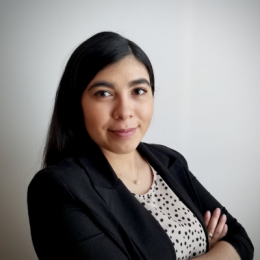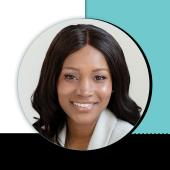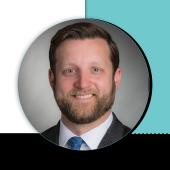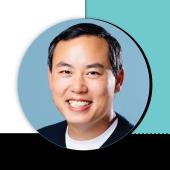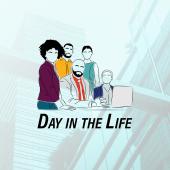The ACC Top 10 30-Somethings awards recognize in-house counsel between the ages of 30 and 39 for their innovation, approach to challenges, well-rounded perspectives, contributions to the in-house community, and pro bono and volunteer work.
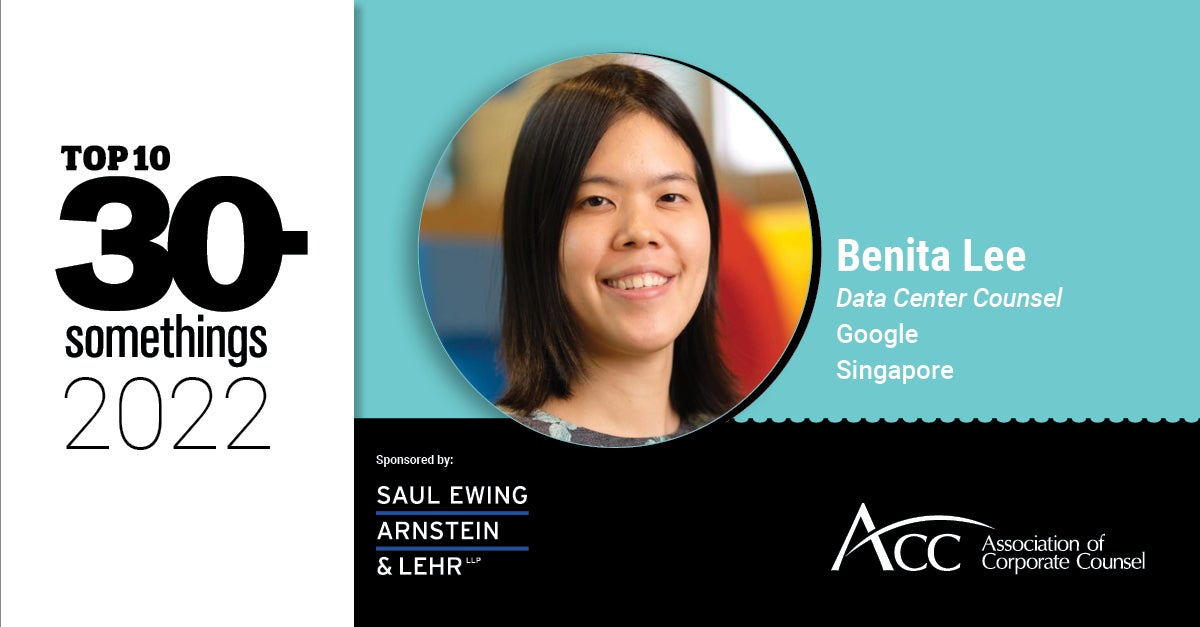
Energy and infrastructure law has been rapidly evolving over the last decade. From private practice to in-house at Google, Benita Lee has observed the transition from conventional to renewable energy up close. “I am part of the generation that has worked on both fossil fuel and renewable energy projects, seeing environmental and sustainability concerns emerge, take root and become part of the collective social fabric,” she says.
Her role as counsel to Google’s data centers puts her in the front seat of a changing industry. As part of its sustainability commitment to operate on carbon-free energy by 2030, Google has designed its data centers to be some of the most energy-efficient globally, improving their environmental performance even as demand rises. And demand is expected to rise sharply in Benita’s corner of the world — the Asia Pacific region (APAC) is anticipated by experts to be the world’s largest data center market in the upcoming years.
In today’s day and age, in-house counsel have to pick up the mantle and lead some of the most out-of-the box projects amid a background of legal ambiguity and regulatory challenges.
“Being at Google has given me the opportunity to tackle some of the most exciting projects that I honestly would have never known existed if I had not moved in-house. It is a role demanding both creativity and practicality.”
- Benita Lee
“Being at Google has given me the opportunity to tackle some of the most exciting projects that I honestly would have never known existed if I had not moved in-house,” Benita reflects, “It is a role demanding both creativity and practicality.”
One such project is Topaz, the first subsea cable to connect Canada and Asia. Expected to be completed in 2023, Topaz will run from Vancouver, B.C. to Japan, resulting in increased capacity and lower latency for Google services and other network operators.
Other pioneering projects which Benita has worked on include Google’s first urban multi-story data center in Singapore, Google’s third private subsea cable from Portugal to Africa and Google’s data center in Taiwan, which is one of Asia’s most efficient and environmentally friendly data centers.
Working in a male-dominated industry, Benita recognizes the importance of mentorship
and promoting greater female participation.
Working in a male-dominated industry, Benita recognizes the importance of mentorship and promoting greater female participation. She actively partners with institutions and organizations like Singapore Management University, Women Techmakers, United Women Singapore, and Tech for She to provide advice and support to women seeking to grow their careers. Referencing the book Invisible Women: Data Bias in a World Designed for Men, Benita stresses the importance of women voicing their opinions because, “If we don't speak up, we don't get counted.”
Q&A with Benita Lee
What advice do you give to those you mentor?
I always seek to broaden their minds to the possibilities in front of them. There are so many opportunities for law students today apart from the well-trodden path of the law firm associate. One could go in-house, one could become an academic, one could join the civil service, one could even join a business or start a business!
At the rate the world is evolving, the reality is that some jobs that are great fits for you might not even exist today. So don't approach your career development with a rigid framework. Always be conscious about what matters to you. And when you find the right opportunity, grab it immediately, and don't let go.
What is the best advice a mentor has given you?
A mentor at the very early stages of my career told me, “This is not a sprint. It's actually a marathon.” Law is a demanding profession, and he had seen so many lawyers fizzle out and fail to keep up with the market or adopt myopic approaches. “If you really feel that this is what you want to do and make an impact, take a bird’s eye perspective, think long term and position yourself strategically.”
His advice has stayed with me, and has guided me to become more nimble and sensitive towards industry trends.
Disclaimer: The information in any resource in this website should not be construed as legal advice or as a legal opinion on specific facts, and should not be considered representing the views of its authors, its sponsors, and/or ACC. These resources are not intended as a definitive statement on the subject addressed. Rather, they are intended to serve as a tool providing practical guidance and references for the busy in-house practitioner and other readers.

